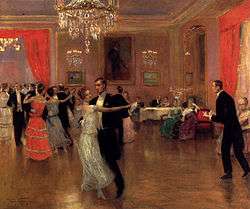Definify.com
Definition 2026
baile
baile
See also: bailé
English
Noun
baile (uncountable)
- (usually "baile funk") A specific genre of dance music originating in Rio de Janeiro, also known as Funk Carioca
See also
-
 Baile funk on Wikipedia.Wikipedia
Baile funk on Wikipedia.Wikipedia
Anagrams
Asturian
Verb
baile
- first-person singular present subjunctive of bailar
- third-person singular present subjunctive of bailar
Galician
Noun
baile m (plural bailes)
Verb
baile
- first-person singular present subjunctive of bailar
- third-person singular present subjunctive of bailar
Irish
Pronunciation
- IPA(key): /ˈbˠalʲə/
Etymology 1
From Old Irish baile (“place; settlement; farm, farmstead; (fortified) village, town, city”).
Noun
baile m (genitive singular baile, nominative plural bailte)
Declension
Declension of baile
Fourth declension
|
Bare forms
|
Forms with the definite article
|
- Alternative plural: bailteacha (Cois Fharraige), bailtí, bailtíocha
Derived terms
Terms derived from baile
|
|
|
Etymology 2
Noun
baile f
- genitive singular of bail
Mutation
| Irish mutation | ||
|---|---|---|
| Radical | Lenition | Eclipsis |
| baile | bhaile | mbaile |
| Note: Some of these forms may be hypothetical. Not every possible mutated form of every word actually occurs. | ||
References
- "baile" in Foclóir Gaeilge-Béarla, An Gúm, 1977, by Niall Ó Dónaill.
- “1 baile” in Dictionary of the Irish Language, Royal Irish Academy, 1913–76.
Old Irish
Pronunciation
- IPA(key): /ˈbalʲe/
Etymology 1
Noun
baile m (nominative plural bailti)
Inflection
| Masculine io-stem | |||
|---|---|---|---|
| Singular | Dual | Plural | |
| Nominative | |||
| Vocative | |||
| Accusative | |||
| Genitive | |||
| Dative | |||
Initial mutations of a following adjective:
| |||
Derived terms
- bailech
Descendants
Etymology 2
Noun
baile m, f
Inflection
This noun needs an inflection-table template.
Descendants
- Irish: buile
Mutation
| Old Irish mutation | ||
|---|---|---|
| Radical | Lenition | Nasalization |
| baile | baile pronounced with /v(ʲ)-/ |
mbaile |
| Note: Some of these forms may be hypothetical. Not every possible mutated form of every word actually occurs. | ||
References
- “1 baile” in Dictionary of the Irish Language, Royal Irish Academy, 1913–76.
- “2 baile” in Dictionary of the Irish Language, Royal Irish Academy, 1913–76.
Portuguese

baile
Etymology
From Late Latin ballāre, from Ancient Greek βαλλίζω (ballízō, “throw”).
Pronunciation
- (Portugal) IPA(key): [ˈbaj.lɯ]
- (Brazil) IPA(key): [ˈbaj.lɪ]
- (South Brazil) IPA(key): [ˈbaj.le]
- Hyphenation: bai‧le
Noun
baile m (plural bailes)
- ball (formal dance)
- (Brazil) any dancing event (not necessarily formal)
Synonyms
Related terms
Descendants
- English: baile
Verb
baile
- First-person singular (eu) present subjunctive of bailar
- Third-person singular (ele, ela, also used with tu and você?) present subjunctive of bailar
- Third-person singular (você) affirmative imperative of bailar
- Third-person singular (você) negative imperative of bailar
- (Brazil) Second-person singular (tu) affirmative imperative of bailar
Scottish Gaelic
Etymology
Pronunciation
- IPA(key): [b̊alɪ], /palɪ/
Noun
baile m (genitive singular baile, plural bailtean)
Derived terms
Terms derived from baile
|
|
|
References
- Faclair Gàidhlig Dwelly Air Loidhne, Dwelly, Edward (1911), Faclair Gàidhlig gu Beurla le Dealbhan/The Illustrated [Scottish] Gaelic-English Dictionary (10th ed.), Edinburgh: Birlinn Limited, ISBN 0 901771 92 9
- “1 baile” in Dictionary of the Irish Language, Royal Irish Academy, 1913–76.